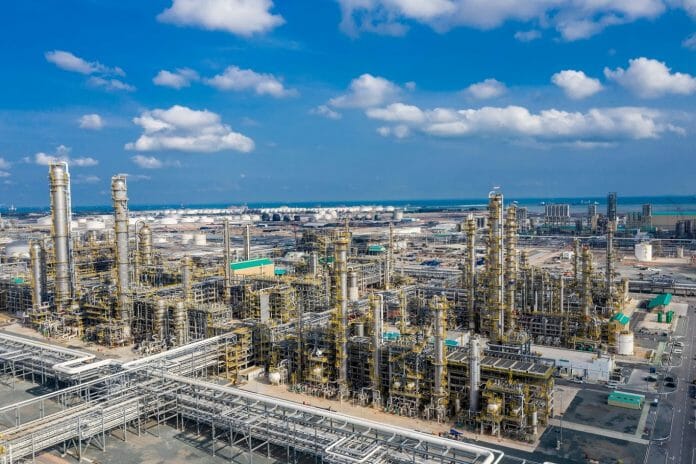MISC Berhad (MISC) will convert one of its existing LNG carriers into an floating storage unit (FSU) for a 20-year time charter to a Petronas Gas-operated regasification plant at Pengerang, Johor.
CGSCIMB said the low time charter rate would not help sentiments on MISC and Dialog Group Bhd (Dialog) may also not have the opportunity to build a third onshore LNG tank at the plant. R
CGSCIMB in its Oil & Gas Sector Note today (Nov 1) reiterates a Neutral call on the Malaysian O&G sector.
MISC to provide new FSU to PLNG2’s Pengerang LNG regas plant
MISC announced to Bursa Malaysia earlier today that it has secured a time charter contract to lease a floating storage unit (FSU) to Pengerang LNG (Two) Sdn Bhd (PLNG2, Unlisted) (pic) for 20 years, effective 2025F, with a contract value of up to US$213.7m.
Petronas Gas’ (PetGas), 65%-owned Pengerang LNG (Two) (PLNG2) with 25% owned by Dialog, and 10% owned by the Johor state government, and operates an LNG regasification plant at Pengerang that supplies natural gas to a power plant.
To fulfill the contract, MISC said that it will convert one of its existing LNG carriers, namely the 137,100 cbm Puteri Delima Satu vessel, into an FSU.
The Puteri Delima Satu LNG vessel ended its 20-year charter to Petronas (Unlisted) in Jan 2023, and has been laid up since. MISC previously said that it was negotiating with a ‘platinum’ client for the redeployment of an LNG ship, which contract has now been announced. MISC did not disclose the conversion cost of the LNG ship to FSU.
Implied daily charter rate for MISC’s new FSU is very low
CGS CIMB cited the estimated FSU contract value of up to US$213.7m implies a time charter rate of just US$29,274/day, which is a far cry from the now-expired 20-year LNG time charter rate of US$130k/day (in our estimate) and also lower than the US$50k/day that we had pencilled for an LNG vessel replacement contract.
Last week, a 145k cbm LNG steam turbine carrier fetched a one-year time charter rate of US$60k/day. By itself, the new, relatively low-rate FSU contract would not make a material impact on our forecasts and target price for MISC, but it does underline the huge rate discount that MISC may have to take on replacement contracts for its legacy LNG fleet, which consists almost entirely of inefficient, first generation steam turbine vessels.
One aspect that may compensate for the low FSU time charter rate is that operating costs could also be very low; compared to LNG ships on voyages, FSUs are stationary and would probably require fewer crew and incur lower maintenance costs.
Overall, CGSCIMB expects that the low FSU rate would not help inspire investors on MISC, since it has about seven high-rate legacy LNG time charters that will expire between now and end-2026F. Also, the FSU will only begin contributing from 2025F, which is at least 14 months away. Separately, MISC will announce its 3Q23F results on 22 Nov, and they expect weaker qoq oil tanker pretax profits as freight rates have weakened after Saudi Arabia and Russia cut oil exports (although tanker pretax profits may trend upwards qoq in 4Q23F, in line with the recently-higher freight rates).
Meanwhile, MISC’s construction profit recognition from the FPSO Mero-3 project may slow down because of the high percentage of completion of 89% already achieved on 30 Jun 2023 where CGSCIMB expects the FPSO to earn time charter hire only upon first oil in early-2025F.
Dialog may not get the opportunity to build the third onshore tank
Reuters reported on 28 Oct 2021 that Petronas sought expressions of interest for a proposed new LNG onshore storage tank at PLNG2, which currently already has 2 x 200k cbm LNG storage tanks, probably to meet additional electricity demand in the future.
Since PLNG2 has now decided to lease a 137,100 cbm FSU, we suspect that Dialog’s engineering, procurement, construction and commissioning (EPCC) arm may not have the opportunity to build the third onshore tank for PLNG2, for now at least.
Any opportunity cost for Dialog is not likely to be material, in our view.
CGSCIMB Neutral call on the Malaysia O&G sector is premised on the weak outlook for petrochemicals, although they are generally positive on the services names in the FPSO and OSV space.
Upside risks on the sector include stronger oi prices may continue to stimulate demand for equipment services while downside risks could involve capexvand opex cost inflation may reduce the margins of O&G service providers.









